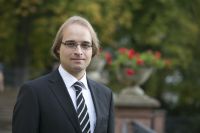Intelligent Communication: Only if there is something to say

Dr. Sebastian Trimpe - winner of the Klaus Tschira Award for achievements in public understanding of science Picture: Klaus-Tschira-Stiftung
Science in clear words: Dr. Sebastian Trimpe, a research scientist in the “Autonomous Motion Department” (Stefan Schaal) at the Tübingen Max Planck Institute for Intelligent Systems, has written a short, comprehensible text that describes the research he conducted during his PhD at ETH Zurich (in German). As winner in the category of computer science, he is one of six awardees who received the Klaus Tschira Award for achievements in public understanding of science on Thursday, October 9, 2014 in Heidelberg.
Trimpe’s PhD thesis deals with communication in networked control systems. In the methods he developed, it is the content of the data that decides, whether the information is sent or not. Each unit transmits data only if it is new, not predictable and especially relevant to the other units.
As a research platform, Trimpe used a two-meter-tall aluminium structure in the shape of a cube. Through the cooperating movements of six arms, the cube can balance on any one of its corners. Communication among the arms is limited to the essential information at appropriate times. This so-called „event-based communication“ results in smooth and efficient data exchange, and avoids inhibiting network congestion. On the cube, the data exchange required for balancing could be reduced significantly.
Because the methods are based on mathematical models and hence an abstract description of the underlying systems, they can readily be transferred to other engineering systems. In future, this research may help that robots, cars or other intelligent machines communicate with their fellows – but only if they really have something to say.
(see Sebastian Trimpe´s personal homepage for his CV in English)
http://www.is.tuebingen.mpg.de
http://www-amd.is.tuebingen.mpg.de/Main/SebastianTrimpe
http://www.klaus-tschira-preis.info/presse.php
Media Contact
All latest news from the category: Awards Funding
Newest articles

Largest magnetic anisotropy of a molecule measured at BESSY II
At the Berlin synchrotron radiation source BESSY II, the largest magnetic anisotropy of a single molecule ever measured experimentally has been determined. The larger this anisotropy is, the better a…

Breaking boundaries: Researchers isolate quantum coherence in classical light systems
LSU quantum researchers uncover hidden quantum behaviors within classical light, which could make quantum technologies robust. Understanding the boundary between classical and quantum physics has long been a central question…

MRI-first strategy for prostate cancer detection proves to be safe
Active monitoring is a sufficiently safe option when prostate MRI findings are negative. There are several strategies for the early detection of prostate cancer. The first step is often a…



